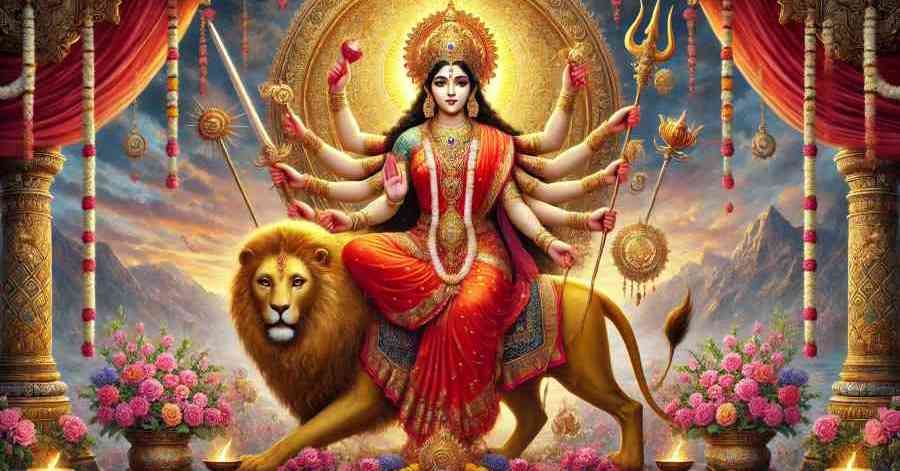Navratri 2025: Dates, Significance, Rituals, and Celebrations Across India
Navratri Festival 2025: A Celebration of Nine Sacred Nights
Navratri Festival – Navratri in 2025 will begin on Thursday, 30th March 2025, and will continue for 9 days until Friday, 07th March 2025.

The Navratri Festival commences on the first day (Pratipada) of the bright fortnight of the lunar month of Ashwin. Celebrated for nine nights annually. The dates are based on the lunar calendar, and the festival may sometimes vary by a day.
Devotional Durga Prayers during Navratri include selected Shlokas from Durga Saptashati, called Saptashloki Durga, which devotees recite daily. These verses are also featured in Vijeshar Panchang:
· Durgay Smritaa Harasi Bheetim Ashaisha Janto Swasthai Smrita Matm Ateeva Shubhaam Dadaasi
· Sarvamangala Mangalyai Shivaay Sarvartha Sadhikay Sharanyai Trambikay Gauri Narayani Namastutay
· Sharnaagata Deenarta Paritraana Paraayanai Sarva Syaarta Haray Devi Narayani Namostutay
· Sarvaswaroopay Sarvaishay Sarva-Shakti-Samanvitay Bhayi-Bhyaa Traadhi No Devi Durgay Devi Namostutay
· Rogaan Ashaishaan Apahansi Tushtaa Rushta Tu Kaamaan Sakalaan Abheeshtaan
· Sravaa Baadhaa Prashamanam Trilokya Syaa Akhilaishwari Ayvam Ayva Twayaa Karyam Asmay Vyri Vinaashanam
On the eighth day, known as Ashtami, Hindus perform “Kanjak”. This involves the worship of young girls symbolizing Goddess Durga. Their feet are washed, and they are given new clothes and gifts as a sign of respect and blessings from the Goddess. Another important ritual is Shastra Ayudhi Puja, where important household or work-related items are worshipped. Historically, soldiers would worship their weapons on this day.
The ninth day, called Ram Navmi, is marked by havans and offerings, especially at temples dedicated to Lord Rama. Some devotees also plant barley on the first day of Navratri, symbolizing new beginnings. The sprouts are later immersed in rivers, symbolizing the Goddess’s blessings for prosperity.
Fasting during Navratri is common. Many devotees eat one meal a day, avoiding certain foods like onions, garlic, and non-vegetarian items, and often opt for special Navratri dishes made without wheat flour.
This festival of Navratri is auspicious for Hindus worldwide and paves the way for Vijaya Dashami (Dussehra), the tenth day. This symbolizes the victory of good over evil, celebrated as the day when Lord Rama defeated Ravana.
Navratri Remedies to Remove House Disturbances and Clashes Between Individuals
Navratri Celebrations Across India
In Tamil Nadu, the first three days are dedicated to Lakshmi (Goddess of Wealth), followed by three days for Saraswati (Goddess of Learning), and the final three days to Shakti (Goddess Durga). Rituals are performed daily with the belief that cleanliness invites the blessings of Lakshmi.
In Punjab, Navratri is a time for fasting. In Gujarat, the evenings are reserved for Garba dances. Devotees dance around an earthen lamp representing Goddess Durga, singing devotional songs while clapping rhythmically to express their gratitude for the Goddess’s victory over Mahishasura.
In northern India, Navratri coincides with the vibrant Ramlila performances, depicting scenes from the Ramayana. In Himachal Pradesh’s Kulu Valley, Dasara is marked by a grand procession of village deities. The Mysore Dasara is equally famous for its vibrant processions led by caparisoned elephants.
In West Bengal, Navratri is celebrated as Durga Puja, the region’s most significant festival. Public celebrations take place with elaborate pandals displaying Goddess Durga’s idols, which are later immersed in water on the tenth day.
Divine Power and Auspicious Time
An Auspicious Time to Celebrate
Navratri is a time for new beginnings. Many Hindus consider it auspicious to start new ventures or purchase gold and other valuable items during this time. Elaborate meals are prepared, and women dress in vibrant attire for the nightly rituals and dances.
Latest Articles
- Which Zodiac Signs Feel the Strongest Energies on Easter?
- Good Friday 18th April 2025✨🌍
- Vaisakhi 2025 – A Harvest of Prosperity & New Beginnings!
- Birth Anniversary of Shree Hanuman
- Transit of Sun in Aries (April 14, 2025)
- Hanuman Chalisa – Importance of Hanuman Chalisa
- Venus Direct in Pisces (April 13, 2025)
- Doshas Cancellation – Cancellation of Doshas in Match Making
© 2025 by Truthstar Future Vision Pvt Ltd All Right Reserved



